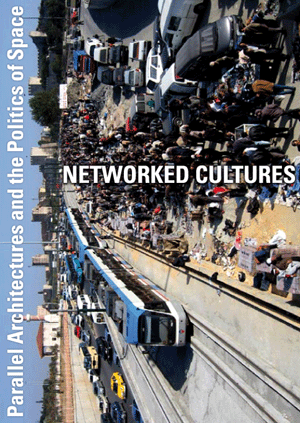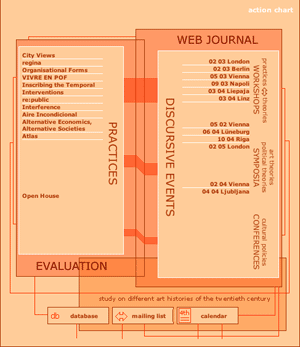_login
registrieren
_5 Factories - Worker Control in Venezuela Dario Azzellini & Oliver Ressler
_ALMOSTREAL ECF
_AnArchitektur Jesko Fezer
_Arizona Road Azra Aksamija
_Balkan Konsulat rotor
_Bata-ville: We are not afraid of the future Nina Pope + Karen Guthrie / www.somewhere.org.uk
_Black Benz Race krcf in collaboration with Felix Stalder, Arben Gecaj, Faton Topalli and Osman Osmani
_Black Sea Files Ursula Biemann
_Camp La Jolla Military ParkOwen Mundy
_CHANGE REALITY: Renaming the Streets of Zagreb REINIGUNGSGESELLSCHAFT
_Conceptual Paradise. There is a place for sophistication Stefan Roemer
_de-regulation Irit Rogoff, Kutlug Ataman, Stefan Roemer

____________Bloomberg SPACE, London
____________Kumu Art Museum Tallinn
____________Open Space, Open Systems - Vienna
____________CAA 2011 Conference, New York
____________Forum Stadtpark, Graz
____________Symposium, Istanbul
____________lungomare, Bozen/Bolzano
____________Metropolis Biennale 2007-17, Copenhagen
____________new publication available now
____________Mestna Galerija, Ljubljana
____________Livestream of Networked Cultures documentary
____________
|
_Database
project:
RepublicArt
location: Vienna

date: 2002-01-01
info:
"An effective concept of postmodern republicanism must be defined au milieu on the basis of the lived experience of the global multitude." (Michael Hardt/Antonio Negri)
Republic is not about reforming a form of state, nor countering the crisis of the nation-state, nor transforming it into one or several super-states. Our investigations focus on the concrete experiences of non-representationist practices, the constituent activities particularly in the movements against economic globalization. Yet, the art of res publica does not imply acclaiming a new global community with revolutionary pathos. It is about experimental forms of organizing, which develop in precarious micro-situations for a limited period of time, testing new modes of self-organization and interplays with other experiments. The "organizing function" of art (Walter Benjamin) creates new spaces in the overlapping zones of art practices, political activism and theory production.
REPUBLICART
"We are experiencing a politicization that is much more radical than any we have known before, because it tends to dissolve the distinction between the public and the private sphere - not in the sense of an invasion into the private sphere by a unified public space, but rather in the sense of a multiplication of radically new and different political spaces." (Ernesto Laclau/Chantal Mouffe)
Public is neither preexistent substance nor immutable terrain. What counts is not claiming or conceptualizing a single public sphere (whether it is one exclusively for privileged classes or for an all encompassing meta-public), but rather permanently constituting plural public spheres corresponding to the many facets of the multitude: a multiplicity of public spheres, not imagined statically, but rather as the becomings of articulatory and emancipatory practices.
Such space-time situations create the preconditions for mutually exchanging different positions, for the different relating to the different. Their boundaries are permeable, they themselves are neither exclusive-excluding, nor inclusive-uniforming.
It is not a matter of consensually unifying public spheres, but rather of conflictually opening them. It is not a matter of homogenization and total transparency, but rather of permanent conflict, the constant renegotiation of different positions. Public as a consuming voyeuristic figure is unthinkable here; the reception of the spectacle is countered by producing singular events, "public man" is countered by plural modes of subjectification.
REPUBLICART
Public Art was already booming in the early 90s in manifold variations: participatory practices, community arts, new genre public art, communication guerilla, concrete interventions, activism, etc. introduced a shift in artistic interests from questions of perception to social and political activities. Temporary projects prevailed over objects, communities over individual artists, participation over art consumption.
Beginning in the mid-90s, more and more critical voices accused these political art practices of depoliticizing or even endorsing the implementation of neoliberal expansion. Arguments given in support of this included the dubious function of art projects in processes of gentrification or in disguising the reduction of social state structures, the appropriation of the projects as a means of tourism marketing on behalf of enhancing city images, the instrumentalization of the difference of marginal themes and groups, a return of the "artist-father" through the back door. As a partial aspect/effect of this wave of criticism, there was a noticeable backlash in mainstream art as well, a retreat into the old spaces, a return to issues of perception and experience in reception.
Now, however, there are signs of a certain change again. What was lacking in the practices of the 90s seems to be given in a new situation: being embedded in a larger context, being cross-connected with social movements. Joining the heterogeneous activities against economic globalization, the old forms of intervention art are being transformed and new ones are emerging. In the context of current political movements, art is becoming public again. Around the issues and activist strands of globalization, border regimes and migration, the conditions are being created to get "revolutionary machine, artistic machine and analytical machine working as mutual components and gears of one another" (Gilles Deleuze/Felix Guattari).
http://republicart.net
|
+ Ana Dzokic and Marc Neelen
+ Ayreen Anastas and Rene Gabri
+ atelier d'architecture autogérée (aaa)
+ Asya Filippova
+ Sophie Hope and Sarah Carrington
+ Branca Curcic
+ Christoph Schaefer
+ Campement Urbain
+ Claudia Zanfi
+ Despoina Sevasti and Poka-Yio
+ Erden Kosova
+ Helmut Batista
Radio as Spatial Practiceby: Paulo Tavares
Survival Kits: Artistic Responses to Globalizationby: Marga van Mechelen
What Ever Happened to Cultural Democracy?by: Sophie Hope
I don't know how to explain ...by: Anca Gyemant
Trading Placesby: Peter Moertenboeck & Helge Mooshammer
Milosevic as Architectby: Srdjan Jovanovic Weiss
When the Unavoidable Knocks at the Door ...by: Gulsen Bal
Tracing Translocality: The BlackBenz Raceby: Felix Stalder
travelling lexicon towards a global positioning systemby: Celine Condorelli
|


